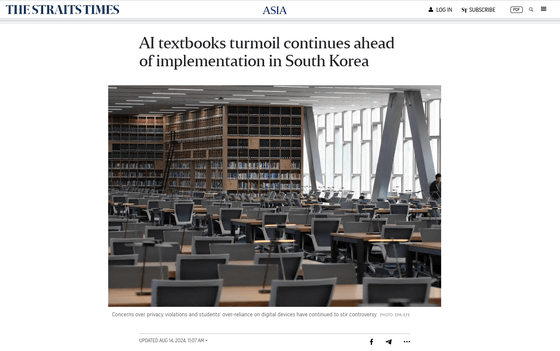Controversy breaks out in South Korea over the introduction of digital textbooks on AI-enabled tablets

Controversy is brewing in South Korea after the country announced it would introduce tablet-based digital textbooks equipped with AI from 2025.
AI textbooks turmoil continues ahead of implementation in South Korea | The Straits Times

South Korea's plan for AI textbooks hit by backlash from parents
https://www.ft.com/content/1f5c5377-5e85-4174-a54f-adc8f19fa5cb
South Korea's AI textbook program faces skepticism from parents | TechCrunch
https://techcrunch.com/2024/08/18/south-koreas-ai-textbook-program-faces-skepticism-from-parents/
Digital textbooks are expected to be used in all subjects except music, art, physical education and ethics by 2028. They will be customized to students' learning speed, and teachers will be able to check how their students are doing from a dashboard.
Deputy Prime Minister and Minister of Education Lee Ju-ho held a press conference and said, 'Digital textbooks do more than just incorporate digital devices into classes; they change and help change classes themselves. We all agree that classes need to move from a one-way, memorization-centered place to a place where students take the initiative in their own learning. 2025 is a critical year for that change, and we need to utilize AI textbooks to help teachers transform their classes.'
The promotion of digital textbooks is sometimes referred to as the 'Lee Ju-ho policy,' and there are concerns that it may be abolished if the administration changes. However, Lee emphasized that 'improving education using digital technology is something that is being promoted across the government,' and explained, 'Even in discussions on the 2022 curriculum revision under the previous administration, emphasis was placed on digital literacy and the use of educational technology, and efforts to introduce AI into public education were on the agenda.'

However, parents with children attending school have sent petitions saying, 'We want them to be able to concentrate on their lessons, not introduce new technology.' Some people expressed concern, saying, 'We are worried that having more opportunities to use digital devices could have a negative impact on brain development. We think children are already using smartphones and tablets too much.'
If all goes according to plan, digital textbooks will first be introduced to third, fourth and seventh graders, followed by fifth, sixth and eighth graders in 2026 and ninth graders in 2027. During the transition period, digital and paper textbooks will be used side by side to avoid confusion for both teachers and students.
Related Posts:







